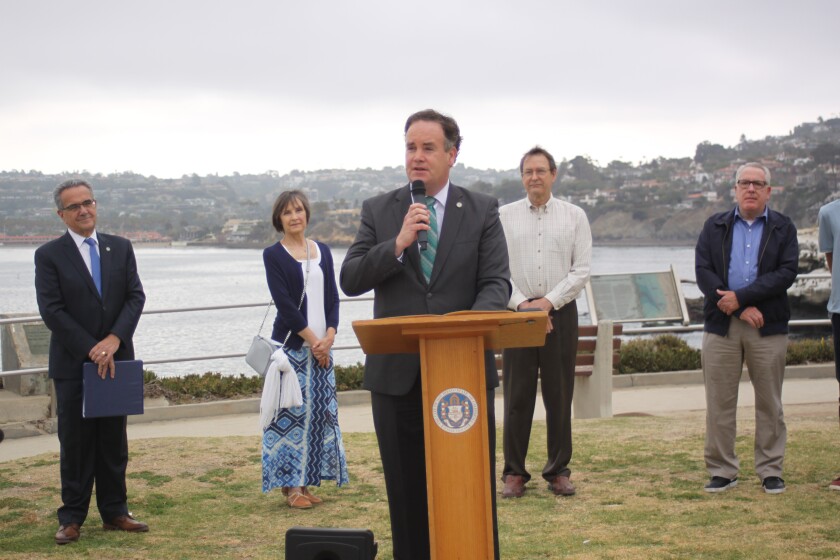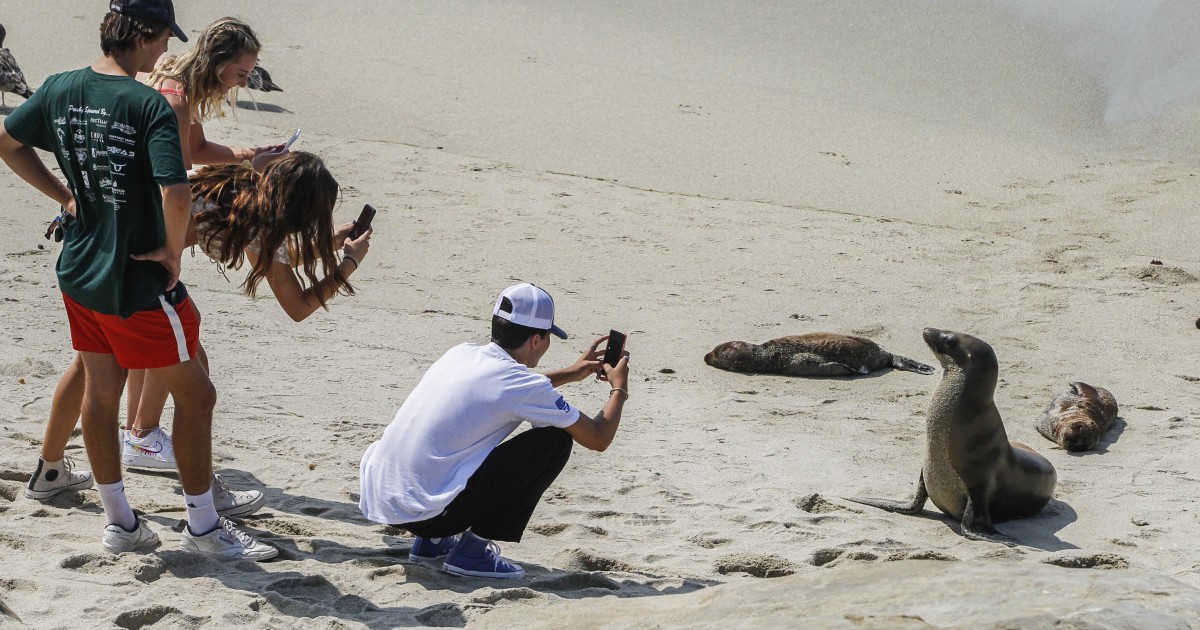In the coming weeks, the city of San Diego will design, fabricate and install signage at La Jolla Cove encouraging visitors to keep a “social distance” from the sea lions that haul out there.
During a news conference overlooking The Cove on Tuesday, City Councilman Joe LaCava (whose District 1 includes La Jolla) and San Diego Park & Recreation Department Director Andy Field, joined by other local leaders, announced the plans for the signs and encouraged “responsible tourism” during the summer.
“Today marks the first day of sea lion pupping season,” LaCava said at the conference. “From now through October 31, many of the female sea lions will be giving birth and caring for their young. Pups must remain on dry land for the first few months before they are ready to venture out into the open ocean. The pups are especially vulnerable, and the mothers, who weigh 200 to 400 pounds, are quite protective. … To ensure the pups’ survival, we must respect the sea lions and their habitat. In collaboration with the Parks & Recreation Department, we are adding additional signage to protect those sea lions and visitors.”

San Diego Parks & Recreation director Andy Field notes the importance of keeping distance from sea lions at La Jolla Cove, during a news conference Tuesday. Behind him are City Councilmember Joe LaCava, La Jolla Parks & Beaches president Claudia Baranowski, Bird Rock Community Council president John Newsam and community volunteer Bill Podway.
(Ashley Mackin-Solomon)
Field explained the city anticipates getting the locations for the signs “locked down” in the coming weeks, and the language to go on the signs is being drafted to “better inform the public about the pupping season and the steps they can take to keep themselves and the surrounding marine life.”
He said, “The language needs to be quick and easy to read, like ‘no smoking.’ The idea is to have similar signs about the need for social distancing away from sea lions (and) giving them a little bit of space, while admiring them from a distance. I know you’ve had plenty of practice with that this past year, so it should be easy for everyone to remember.”
He said last summer saw an unprecedented number of visitors to La Jolla Cove, and that similar numbers are expected this summer.
“While it’s understandable for the public to be fascinated by the local sea lion population and want a closer look, it is of the utmost importance that we are doing everything we can to protect and respect these animals while they care for their young,” Field said, and that city rangers and staff have been and will continue to be on-site to educate visitors.
LaCava added, “There are few places where you can be on dry land and watch the sea lions up close in their natural setting. Being this close has its advantages, it’s a memorable experience for children and adults alike. However, we have to remember we share the coastline with these marine mammals, which seem docile, but are wild animals that will protect themselves and their young. We are committed to keeping both humans and animals safe … not only during pupping season, but all year round.”
The announcement of the planned signage came after a weekend of “chaos” at La Jolla Cove, at which Sierra Club Seal Society docents reported multiple incidents of harassment of newborn sea lion pups.
LaCava said his office was in the process of “independent verification” of these incidents.
Sierra Club docents were on-site during the long Memorial Day weekend to encourage visitors to keep their distance from the sea lions.
“The sea lions don’t have the same protection as the harbor seals at Children’s Pool (which is closed during the harbor sea pupping season),” observed docent Elena Tillman. “I’ve seen people hop the wall and go down the stairs leading down to see the sea lions. I’ve seen people getting in their faces, fly drones in their faces, stand over the pregnant females, take selfies with them, etc. This seems innocuous, but the sea lions have a really low threshold for abandoning their pups. If someone gets close to them or the pup, if the pup smells like a human, they will abandon them. I have also seen emaciated pups, and I have seen some die. Abandonment is a big issue.”
Docent Donna Beal added that she witnessed a visitor kicking the sea lions to get them to lift their heads for a photo. “A lot of bad stuff is happening,” she said. “It’s chaos.”
During one of her patrols overlooking the beach, she said, “I saw a mob of people and a small sea lion corralled into a corner. They were trying to touch it and get selfies. They had its face against the cliff and the water was beating this pup for a few minutes. By the time I could run down the stairs and clear the area the pup could barely move … We knew it wasn’t going to make it through the night. Sea World came the next morning and confirmed the pup didn’t make it.”
Wildlife photographer Mandy Etpison, who moved to La Jolla a year ago, said she was “shocked” at the lack of protection and full-time staff to keep people and sea lions apart.
“There is a huge difference between (when) the rangers are there and when they are not,” she said, and that she documented a sea lion pup being born, and the crowd of people that soon surrounded it.
“A lot is a lack of education,” Etpison said. “If there is no one there to stop them, people can gather and stress the animals out. They don’t understand the cost.”
Mackin-Solomon writes for the U-T Community Press.

